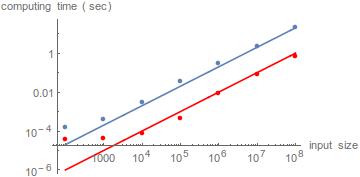I'm having quite a hard time with the following. I would like to partition a list into a list of sub-lists, in such a way that the number n of sub-lists is fixed.
For example, suppose I'm looking for a partition of size n=3:
L = {1,2,3,4,5};
n = 3;
size = Ceiling[Length[L]/n]
Partition[L, size, size, {1,1}, {}]
{{1, 2}, {3, 4}, {5}}
Great! But now I run into problems when n=4. Namely, the above method produces the same length 3 output. This is basically due to exhaustion of the original list L.
My solution so far is to use an ad hoc if statement that takes an element from the first bucket:
L = {1,2,3,4,5};
n = 4;
size = Ceiling[Length[L]/n]
newL = Partition[L, size, size, {1, 1}, {}]
If[Length[newL] < n,
AppendTo[newL, {newL[[1, 1]]}];
newL[[1]] = newL[[1, 2 ;;]];
];
newL
{{2}, {3, 4}, {5}, {1}}
Is there a better way to do this?
Edit 1:
kguler's answer was great, but Kellen's solution definitely performs better for large inputs: (blue = kguler's bpF2, red = Kellen's splitup)

Thanks guys!
Edit 2:
I answered my own question below, because I found a nice one-liner solution which also improves performance.

pof parts, so thatp(k-1)<nand then just pick out the firstk-1parts to be of sizep, and throw everything into the last part. My answer will assume that you want parts of nearly-equal (off by one) size. $\endgroup$